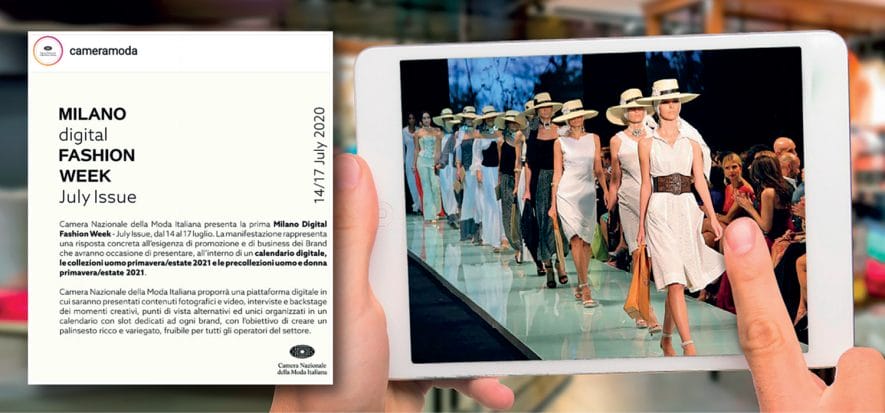To define the presentation formula for the next Spring Summer collection, Ermenegildo Zegna coined the term “phygital”: because it will occur in a combination of physical spaces and digital environments. Milan, Paris, London: fashion weeks worldwide are moving in the same direction, circumventing the restrictions imposed by social distancing with online solutions. It is the carousel of fashion under the lash of Coronavirus: next summer (at least) events are going virtual. Looking forward to understanding what the new balances will be.
CNMI’s choice
Photos, videos, backstages and interviews. But also webinars, lessons and the usual respect for emerging designers. Since fashion is also business, everything will be accompanied by a virtual showroom for sale. Camera Nazionale della Moda Italiana announces that from July 14th to 17th fashion week is transformed into Milan Digital Fashion Week.
“Our goal – comments Carlo Capasa, president of CNMI, to the press – is both to support the restart of the entire fashion system, and to reach the media, buyers and the entire fashion community. How? Through a multitude of contents, designed for all the players in the system. It is a great result for us to add for the first time, within this initiative, also a section exclusively dedicated to the support of showrooms and buyers”.
Milan, Paris, London
A similar move was also announced by Fédération de la Haute Couture et de la Mode. Parisian fashion week shifts the appointment of July 9-13 (thus anticipating Milan) in a digital environment, so that each house has the opportunity to represent itself with images and videos, as well as with additional editorial content.
At the end of April the British Fashion Council declared having the same intentions, proposing on June 12-14 the Cultural Fashion Week Platform. The organisers, on the other hand, already have some experience. In Milan, for example, the digital formula had already been tested in February for international audiences who had not been able to attend fashion shows. Other events, such as Shanghai, took place completely in a virtual environment.
What now?
Observers wonder about the immediate and future effects of a transformation of the fashion week genre. At the end of April Angelica Cheung, editor of Vogue China, observed from The Times columns that the turning point can turn out to be positive. Why? Because it takes events in the direction of efficiency and sustainability. It forces everyone to ask whether there really is a need for insiders to spend a substantial part of the year traveling the world to attend presentations that they can follow by remote.
The question does not end here. Vanessa Friedman (New York Times) notes that the phygital solution is the best today, when there are no alternatives. But it is not said that it is in absolute terms. Backstages and insights create a connection with the audience, well. But above all they talk about the people who make and interpret fashion. Videos and photos push attention to storytelling, but play far from the materiality of the collection. Parades, on the other hand, work for the relationship and concentration they allow on the individual garment. In order for fashion weeks to remain even remotely valid, it is necessary not only to recreate the events in streaming, Friedman concludes, but to rethink them completely.
Read also:
- Versace has learnt a lesson on digital during lockdown stage
- Chiuri explains Dior lockdown: online meetings, dubious scenarios











